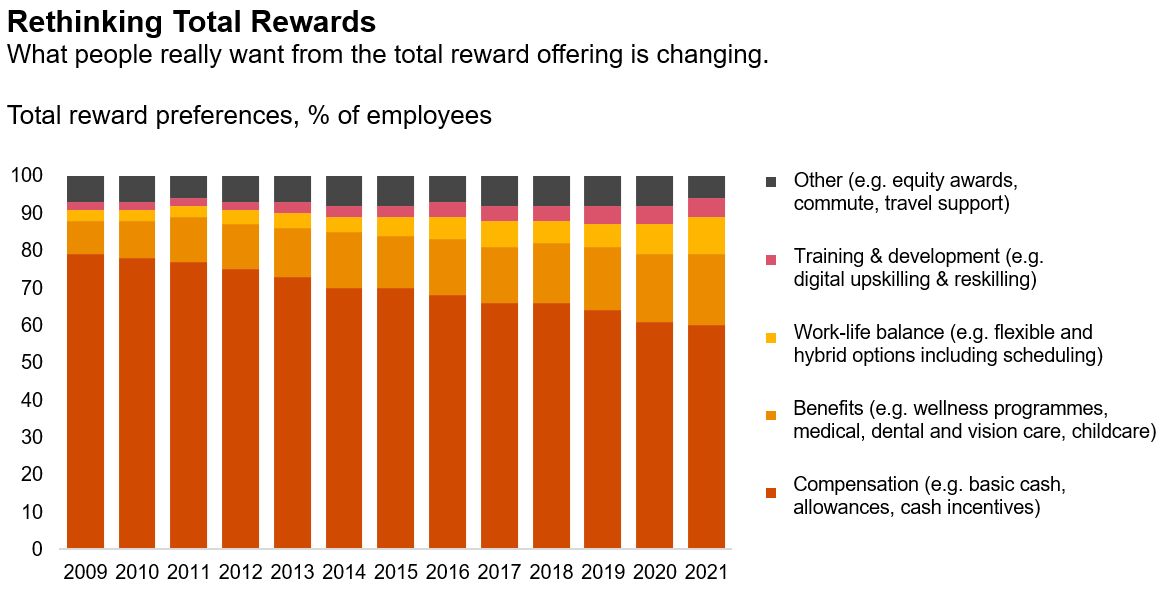{{item.title}}
{{item.text}}

{{item.text}}
Róbert Bencze
Director, People & Organisation, PwC Switzerland
Aidan Manktelow
Manager, People & Organisation, PwC Switzerland
Organisations in Switzerland face a major challenge to attract and retain talent. There is no single solution to the problem, but there are a number of approaches and tools to address it. Preference analytics based on measuring and understanding employee preferences allow companies to reshape their employee value proposition, including rewards and benefits, with more personalised offerings. The result is to strengthen attraction and retention while optimising costs.
Organisations across Europe face a shortage of qualified and talented workers, and Switzerland is no exception. The economy is practically at full employment, and the Swiss Skills Shortage Index is at an all-time high. The unemployment rate was just 2.2% in January 2023 and there were 121,800 job vacancies in the fourth quarter of 2022, double the level five years earlier.
Tougher economic conditions could slightly relieve some of the pressure in the short term – for example, tech talent may be more readily available as the sector makes sweeping layoffs after over-hiring during the COVID pandemic. But fundamentally, this is a situation that is set to persist as a result of demographic trends – the baby boomers are retiring and not being fully replaced. Switzerland faces a shortage of 365,000 qualified workers by 2025.
What is more, PwC’s Workforce Hopes and Fears Survey 2022 suggested that Swiss employees are dissatisfied. Their job satisfaction is lower than in other countries (50% vs. 57%), and 1 in 5 are considering a job change in the next 12 months. This means the ‘great resignation’ seen in English-speaking countries could yet become a reality in Switzerland.
In this context, attracting and retaining good people are top priorities for employers. So according to PwC’s CEO Survey 2023, Swiss CEOs are rejecting reducing compensation as a way of dealing with the economic challenges of the next 12 months (83% say their companies are not planning this). On the contrary, most companies are having to offer wage increases. CEOs also say that they are generally not planning staff reductions (71%) or hiring freezes (60%).
Instead, companies are looking to strengthen their employee value proposition (EVP). Culture and leadership are both key elements – 68% of Swiss CEOs say that their companies will work on culture and behaviours over the next 12 months. Offering opportunities for reskilling and upskilling is also important for attraction and retention, as well as for developing the skills organisations will need for the future, and will be a focus for 59% of Swiss firms.
There is also an opportunity to refine pay, incentives and benefits (42%). The fundamentals of corporate rewards have changed surprisingly little over the past decade even as the workforce has become more heterogenous. Employers continue to offer a standard menu – e.g. health benefits, pension contributions, gym memberships – without assessing what employees prefer and value most highly.
In fact, employee preferences have shifted considerably. Data from PwC and TrueChoice Solutions, a leading global preference analytics company headquartered in New York, show that over the past decade the relative importance of financial compensation worldwide declined by 24%. Meanwhile, the significance of benefits such as medical and life insurance, wellness and supplemental health benefits and childcare doubled, while preferences for work-life balance options (e.g. flexible and hybrid working) and training and career development tripled.
Source: PwC TrueChoice solutions analysis of employee preferences data from more than 10 million employee interactions with more than 50 million data points.
There is also a growing need to redesign rewards and benefits to reflect an organisation’s values and priorities to both employees and investors. This will be an important consideration as ESG assumes greater prominence. For instance, by providing contributions towards continuing education that will make people more employable even beyond their time with the organisation, employers can emphasise their commitment to investing in their people. Rewards can be designed to strengthen engagement, satisfaction, retention and performance.
Methodologies and tools based on employee preference data and advanced analytics are now available that enable organisations to determine which remuneration components and incentives are most important to employees and then to design more personalised compensation packages. A wide range of data can be gathered on employee preferences across different topics, including salary, healthcare, wellbeing, purpose, learning, lifestyle, flexibility and pensions.
Organisations can then be supported to refine their full EVP based on employee preference data, market benchmarks and analytics. Personas can be developed to design customised reward and benefit packages for different groups of employees. Predictive analytics ensures that EVP is adapted to future expectations.
Refining incentives and benefits in this way offers organisations two key advantages. First, it strengthens organisations’ attractiveness to both current and potential employees. Companies can offer authentic, relevant and distinctive employee value propositions, with a choice of packages that tangibly reflect the organisations’ stated values and are optimised to employees’ preferences. A menu of choices – clearly explained and well laid out – offers the consumer-type experience that 80% of people now expect from their workplace.
A global bank was facing increasing turnover after the COVID-19 pandemic. Discussions revealed that it had failed to change and upgrade its offerings in terms of benefits and working conditions – while employee needs and expectations had radically changed. A preference analytics exercise covering a broad set of EVP elements, including rewards, benefits, flexible working and development opportunities, led to sweeping changes. The bank introduced different EVP offerings, which varied for example between HQ and the branch network and between generational segments. The outcome was a significant increase in employee satisfaction and retention.
Second, refining incentives and benefits may allow for cost optimisation. Tailoring reward options will often cost companies less than their current blanket packages while generating a greater return on investment. For instance, supplemental healthcare offerings, such as dental care and private care in countries with a national health service, have a perceived value for employees that is at least 1.5 times the cost of providing such benefits. Using predictive analysis to reconfigure choices can yield a return on investment of up to five times by offering what employees really want and dropping things that are not valued.
A telecoms company in Europe was faced with potentially having to lay off hundreds of employees during a challenging period. Seeking alternatives, it carried out a preference analytics investigation of its complex rewards and benefits system. As a result, the company was able to implement USD 2.7 million of savings without any negative impact on the preference level, and consequently could retain 700 jobs.
This is particularly relevant in the current context, where on the one hand economic conditions are becoming more difficult and uncertain, but on the other hand, staff reductions, wage freezes and wage cuts are off the table because of continued strong competition for talent. Organisations may then need to find other ways to address costs. It is also a reminder for organisations being sucked into a bidding war for talent that competitive salaries, although important, are only one part of the solution.
If these are issues that affect your organisation and if you would like to learn more about solutions, please get in touch.
The future starts now. Are you ready? The challenges that leaders face today are more significant and complex than they’ve been in generations. Learn about the insights we've gained about specific challenges organisations face as they look to build, equip and support tomorrow’s workforce.
#social#



